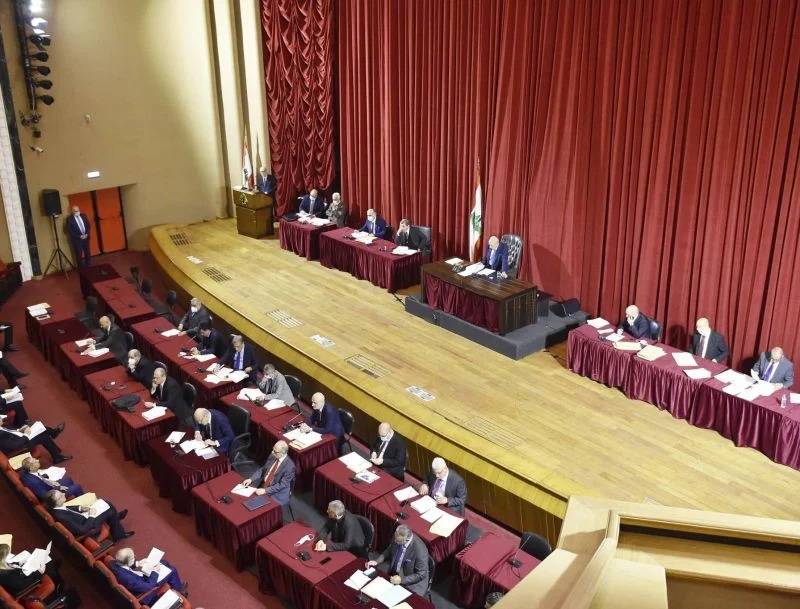
Parliament meets at UNESCO Palace on Tuesday. (Credit: Ali Fawaz/Lebanese Parliament)
BEIRUT — Lebanon took another step forward toward implementing long-delayed social assistance programs when Parliament on Tuesday approved amendments necessary to unlock World Bank funding for a Emergency Social Safety Net (ESSN) program following months of day.
The legislature, which met in Beirut’s UNESCO Palace as dozens of protesters gathered outside, approved 20 other laws, including one aimed at regulating pharmaceutical imports, while 15 draft laws were sent back to committee for further discussions.
While the World Bank greenlit a $246 million loan for the ESSN program in January, changes to the mechanism passed by parliament in March posed a stumbling block, as they were made without the international organization’s approval.
On Dec. 1, officials announced the rollout of a platform for applicants seeking to register long-delayed social safety net programs. As of Tuesday evening, over 150,000 have filed applications for aid, according to the live tracker provided by the state IMPACT data transparency organization operating the platform.
In June, Parliament approved a separate assistance card to provide cash payments to vulnerable families, but questions linger over how it would be funded. Last week, World Bank regional director Saroj Kumar Jha told L’Orient Today that while Lebanon’s cabinet filed a request for the Bank to fund this other card, it first needs to get the ESSN program off the ground.
During discussions on a draft law regarding spending of $1.135 billion worth of funds procured from the International Monetary Fund’s Special Drawing Rights (SDR) program, Premier Najib Mikati said that the World Bank had demanded that Lebanon fund the ration card, separate from the ESSN program, for its first two months, which would cost 80 million US dollars.
Afterward, the PM said, the World Bank could provide the rest of its funding. Mikati argued that the Lebanese state could use the SDR money to cover these costs. Parliament kicked back the draft law, which would have granted Parliament authority over the funds, back to committee for further discussion.
Parliament was supposed to tackle the ESSN amendments when it last met on Oct. 28, however the session was cut short after a heated argument erupted over whether a vote on amendments to the law governing the upcoming 2022 parliamentary elections had crossed the threshold of “absolute majority.” The Free Patriotic Movement, which opposes the amendments, has since appealed the vote on the electoral law to the Constitutional Council, which is expected to render a judgement by Dec. 17.
MPs on Tuesday voted to establish the National Agency for Medicine, as proposed in a draft law put forward by Parliament’s Finance and Budget Committee in October with the aim of combating “fraud and monopoly” in the sector.
Among the other items approved by Parliament was one to increase fines from LL50,000 to LL250,000 for residents failing to adhere to COVID-19 countermeasures, amid an uptick in hospitalizations for the virus in recent weeks. On Dec. 1, Lebanese authorities announced new holiday season restrictions in a bid to curb further spread of COVID-19.
As MPs met in the UNESCO Palace, parents of Lebanese students studying abroad gathered outside to protest failures to implement a “student dollar law” approved last year allowing them to transfer abroad up to $10,000 a year at the official rate of LL1,515 to the dollar to pay education expenses.
Parliamentarians voted to authorize transfers for the 2021-2022 school year as well as a law criminalizing financial institutions not complying with the “student dollar law,” the latest development in a long-running saga that has seen parent groups stage protests aimed at kicking-off the implementation of the law.
Parliament did not approve a slate of draft laws, including one to renew for another year a law passed last December to lift banking secrecy to facilitate a long-obstructed audit of the central bank.
Finance Minister Youssef Khalil in September inked a new contract with consulting firm Alvarez & Marsal to undertake a forensic audit of Banque du Liban's accounts, after the firm last year terminated its first contract due to the central bank’s refusal to provide it with necessary documents.
The new audit, however, allegedly hit a roadblock in November, with President Michel Aoun on Nov. 24 asking the BDL Gov. Riad Salameh to hand over documents requested by the consulting firm. The central bank said that same day it would comply, amid reports Alvarez & Marsal had threatened to back out from the new contract.
A draft for compensations for victims of the Aug. 15 fuel tanker explosion in the northern Lebanese village of Tleil was also sent back to committee, as it had not yet been discussed at that level.